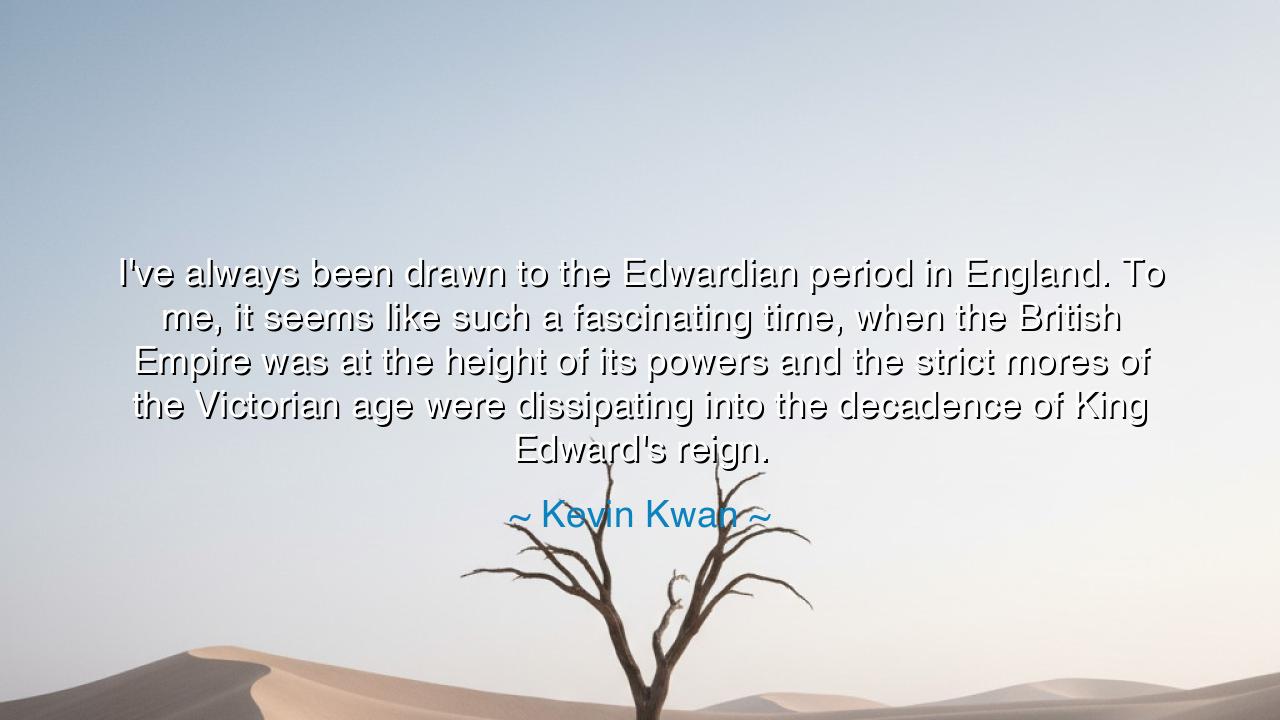
I've always been drawn to the Edwardian period in England. To me
I've always been drawn to the Edwardian period in England. To me, it seems like such a fascinating time, when the British Empire was at the height of its powers and the strict mores of the Victorian age were dissipating into the decadence of King Edward's reign.






"I've always been drawn to the Edwardian period in England. To me, it seems like such a fascinating time, when the British Empire was at the height of its powers and the strict mores of the Victorian age were dissipating into the decadence of King Edward's reign." – Kevin Kwan
In the grand tapestry of history, there are moments when the threads of power, culture, and morality intertwine in a way that shapes the course of generations. The Edwardian period in England, as described by Kevin Kwan, represents such a moment—an age where the British Empire stood tall, its influence reaching across continents, while the old moralities of the Victorian era began to unravel, making way for the decadence and excesses of King Edward’s reign. It was a time of profound transition, when the strict codes of conduct that had defined the British aristocracy for decades began to dissolve, and the gilded age of indulgence emerged.
This period, from the end of the 19th century to the early 20th century, was one of stark contrasts. The Victorian era, characterized by its rigid social mores, its obsession with duty, and its focus on propriety, gave way to a more liberal, decadent ethos. It was as if society, having long carried the heavy weight of morality, finally sought respite in indulgence. In Edward VII, the nation found a ruler whose reign marked the twilight of one age and the dawn of another—a time when the grand façade of decorum and restraint began to crack, revealing the more playful, often reckless spirit of the age.
Consider, for example, the life of Oscar Wilde, whose writings and lifestyle epitomized the tension of this age. Wilde, a man whose wit and charm captivated the society of his time, found himself both a product and a victim of the Edwardian society’s contradictions. He revelled in the luxuries and excesses that the era had to offer, yet his tragic fall came when society, still deeply rooted in Victorian ideals, could not reconcile his life with its newfound freedoms. Wilde's story is a poignant reminder that the transition between the old and the new is often fraught with pain, even as it brings the promise of change.
The Edwardian era was not merely a time of political and cultural shifts but a period that witnessed the rise of a new elite, one that had the luxury of questioning the old societal norms. The British Empire at its peak, stretching its imperial arm across vast swathes of the globe, was at once a symbol of power and control, and a reminder of the fragility of that power. The indulgence of the Edwardian period—its fashion, its art, its entertainment—was a reflection of a society that had achieved so much and, in its complacency, began to lose its sense of purpose.
However, history teaches us that such periods of decadence and excess rarely last. The age of Edwardian indulgence was followed swiftly by the storm clouds of World War I, which would forever alter the landscape of Europe and the world. The war shattered the British Empire, both in terms of its territorial holdings and the moral certainties that had supported it. Much like the fall of ancient civilizations, the Edwardian period, with its heady mix of opulence and decay, was a brief moment in the grand cycle of rise and fall.
The lesson here is timeless: in moments of great power, when the weight of history seems to rest on the shoulders of the present, there is also the danger of becoming complacent, of indulging too freely in the fruits of success. The Edwardian period, with its excesses, reminds us that decadence can blind even the most powerful empires to the approaching storm. It is not the height of power that guarantees longevity, but the ability to remain rooted in purpose, to recognize that every age of growth is followed by an age of reckoning.
In our own lives, we must learn from the Edwardian paradox. While it is tempting to seek comfort in times of success and achievement, we must not forget the importance of balance. In times of prosperity, we must be mindful not to lose sight of the deeper values that have sustained us. The lesson of the Edwardians, and of every empire before them, is this: never forget the price of indulgence, and never mistake the shadows of decadence for the light of true strength.






AAdministratorAdministrator
Welcome, honored guests. Please leave a comment, we will respond soon